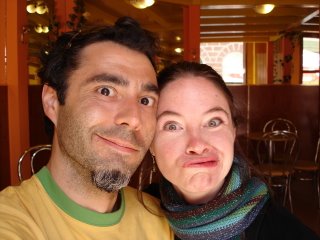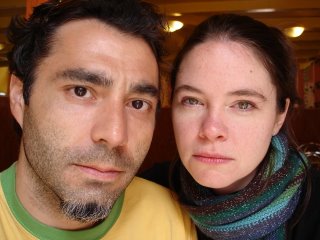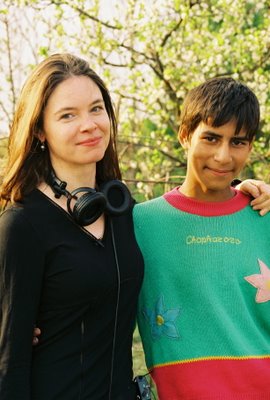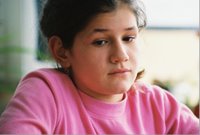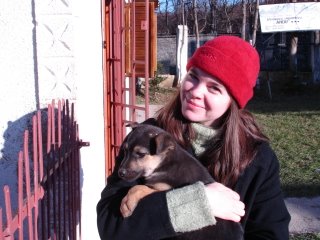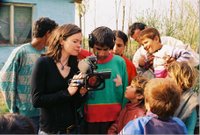
The video jogged Zoro's memory. He started to cry. I hugged him, and he rubbed his hand up and down on my back. He said in Hungarian that he wanted to go back to the school. His mother said that he couldn't go back; if he went, she'd never get him back again. Zoro's father agreed; if he let Zoro go, they'd never get him back. She began to watch me warily, not letting Zoro out of her sight. Eventually, I asked if we could come back the next day so that we could talk more about the whole situation. I needed to regroup. What had I done?
When I sat with Zoro and his mom the next day at the bilingual neighbor's house, she explained to me that she had to take the youngest of her five children, Zoro and one of his brothers, to the orphanage in Satu Mare when Zoro was two years old, because his father left her for another woman. Since she was homeless, she had no choice. She had no money or transportation, so she rarely visited the orphanage. One day she went to visit and found out that Zoro had been transferred to Beclean a month earlier, which was impossibly far away for her. She didn't know how to get there, and she didn't have the money anyway. While she was recounting this, she started to cry, and this got Zoro crying. She said he had never heard all this before, because she hadn't wanted to tell him how hard things were for her.
Her parental rights were eventually terminated, because during the years Zoro spent in Beclean, she never visited. So when social workers from Satu Mare contacted the aunt, the aunt legally adopted him so that his mother could get him back. Things are better now for the family; they have a house, though ten people share two rooms and two small beds.
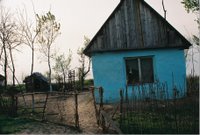

The floor is bare dirt. It has a strong smell because they have no plumbing, water, or electricity, and the goose and pig wander in and out of the house when the door is open. The 4-inch black and white television is connected to a car battery. Every social worker is required to evaluate the family's living conditions before reintegrating a child into the home. Zoro's social worker evidently decided that these were acceptable living conditions.
Zoro doesn't go to school anymore because-according to Zoro and his mother--he is alays getting into fights. His mother says that he suffered a breakdown soon after arriving in the village, and that he is supposed to take medication--but she can't afford it. She gets $44 dollars a month for Zoro from the child welfare department--$14 of which is for medication that costs over $40 a month. If Zoro had been placed in a foster family, that family would have received $273 per month plus a clothing allowance. They would have been required to have a certain standard of living, including electricity, flooring, and running water. The $44 a month is a significant amount for Zoro's family; they have been able to make a few additions to the home. His mother makes a living by canning vegetables, which she then sells in the village. This is summertime work only; in the winter, things are very hard.
The situation is so complicated, and by making myself the only link between Zoro's present and past, I now feel an obligation to follow through. But how? The living conditions are so difficult; I can't imagine how the family made it through the winter. The neighbors' homes are even less solid, some roofless, or with plastic for doors and windows. But what is the alternative for him? The system will not take a child back unless abuse is reported, and even if that were going on (which I could not determine from such a short visit), where would he go? He has been legally adopted by his aunt. While Zoro liked living at the school in Beclean, he couldn't stay there forever. Given his emotional sensitivity and his intellectual limitations, I don't know how he would have fared at the age of 18 when he would be on his own. The children in Beclean raise this question a lot--what happens when we turn 18 and we're out the door? It's a scary prospect, when you have no family to help you.
The filmmaking aspect blurs ethical lines even further; I want to include Zoro's story, because I feel it's important to hear about his experience, as well as his mother's. Ninety percent of Romanian gypsies live in dire poverty, which is why about 70% of the abandoned children (approximately 5,000 per year) are of Gypsy ethnicity. These children have virtually no chance of being adopted by a Romanian family, so they are generally raised in the state system until they're old enough to be returned to their biological families, whom they've often never seen. Zoro's mother doesn't want him to leave, though I can't tell which reasons are most important to her. Is it that he helps around the house and in the fields? That he brings the family a little money each month? That she loves him as she says?
Quite telling was Zoro's comment to me, when his mother was out of range. I said, "Zoro, you told me three years ago that you wanted a family. Is this a family for you?" He said something in Hungarian that I have to have translated, but I think he said "I wanted a family, but..." Then he gestured at his mother and said, "Tiganca" ("Gypsy") and kind of shook his head and shrugged. Like many children of Roma (Gypsy) ethnicity, he grew up associating the Roma, or Tsigani, with crime and disrepute. They were shady characters to be avoided, not emulated or lived with. The word "Tsigan" has a pejorative connotation in Romanian that the English word "Gypsy" doesn't have--it is somewhat like "nigger" depending on the context, and is used as an insult by Romanians and Roma alike. However, many Gypsies refer to themselves as "Tsigani," and some have never even heard the more politically correct word "Roma." Roma children raised in an institution do not identify as Roma or "Tsigani," and the look on Zoro's face as he said this was so subtle...I can only interpret from my own limited perspective. It was half bemused, half resigned. Surprised, like he wondered how the hell he got here. When I showed him some video I'd shot of him that day, he said, "Who is that?" and his mother said, "Zoro--that's YOU!"



